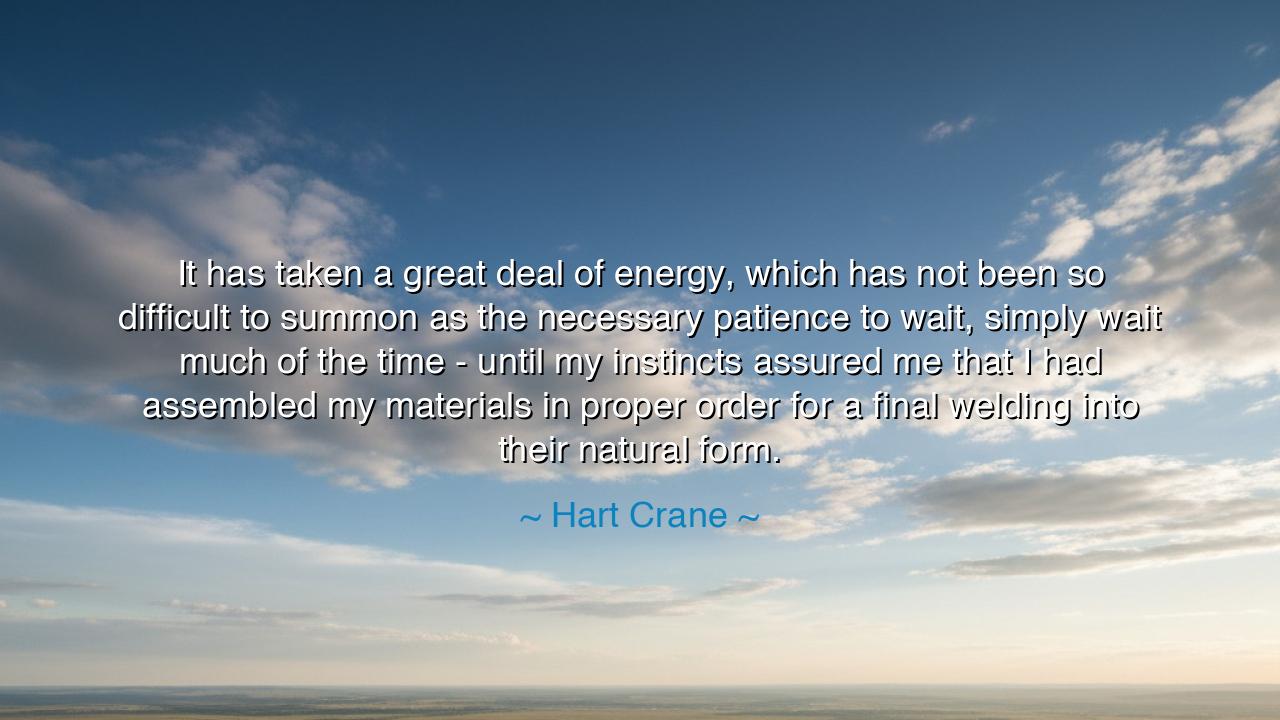
It has taken a great deal of energy, which has not been so
It has taken a great deal of energy, which has not been so difficult to summon as the necessary patience to wait, simply wait much of the time - until my instincts assured me that I had assembled my materials in proper order for a final welding into their natural form.






Hear now, the words of the poet Hart Crane, who labored in silence and in fire to bring forth his vision: “It has taken a great deal of energy, which has not been so difficult to summon as the necessary patience to wait, simply wait much of the time – until my instincts assured me that I had assembled my materials in proper order for a final welding into their natural form.” In this utterance lies not merely the tale of a man forging poetry, but a universal truth about creation, endurance, and the timeless rhythm of becoming.
For Crane speaks of the twin forces that guide all makers: energy and patience. Energy, like a rushing torrent, is easy to summon for those who burn with passion. It surges within, carrying the creator forward with intensity and fire. But patience—ah, patience!—this is the rarer virtue, the discipline of the ancients, the stillness that allows all scattered pieces to fall into their destined place. Without patience, energy becomes chaos; with patience, it becomes form.
Consider the smith at his forge, who must wait for the metal to reach its right heat before the hammer can strike true. Should he strike too early, the iron resists and shatters. Should he wait too long, the fire consumes it. The same is true of the poet and his words, the inventor and his designs, the leader and his plans. The great “welding into natural form” comes not from haste, but from that sacred interval of waiting, where instinct whispers: “Now is the time.”
So too did Alexander the Great know the power of waiting. When he besieged Tyre, his men grew restless, for months passed with no breach in the city’s walls. Many urged him to abandon the effort. Yet Alexander, though filled with boundless energy, tempered his force with patience. He waited, building his great causeway stone by stone, until the sea itself bowed to his will. When the moment ripened, he struck, and Tyre fell. Thus we see: it is not only strength but timing that conquers empires.
Crane’s words remind us also of the deeper struggle of the soul: to trust one’s instincts. For in the stillness of waiting, doubt creeps in. The mind questions the order of its materials, the worth of its efforts. Yet the poet declares that in the end, instinct reveals when the fragments of inspiration are ready to unite into wholeness. This is the mystery of all creation, where vision matures unseen until the hour of birth.
What, then, shall we learn from this testimony? That in our lives, whether we build poems, businesses, or families, we must guard against the tyranny of haste. To act too soon is to spoil the work; to despair in waiting is to abandon it. Let patience be the companion of your energy, and instinct the compass that guides your steps. For when energy and patience walk hand in hand, destiny takes form.
Practical wisdom flows from this teaching: Create with vigor, but wait with trust. Do not force your ideas before their season, but continue gathering, shaping, refining, until the moment reveals itself. Train your heart to discern between delay and ripening, between fear and readiness. Keep faith that what you build in silence shall one day stand in the light, welded whole, and shining with its natural form.
Thus, O listener, take this lesson into your daily path: summon your energy freely, but honor the sacred discipline of patience. For in this union lies the secret of the ancients, the power to turn fragments into monuments, sparks into fire, and dreams into enduring reality.






AAdministratorAdministrator
Welcome, honored guests. Please leave a comment, we will respond soon